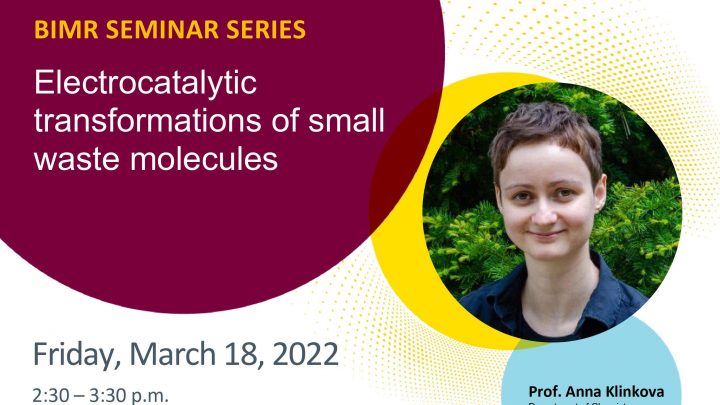Electrocatalytic transformations of small waste molecules
Mar 18, 2022
2:30PM to 3:30PM

Date/Time
Date(s) - 18/03/2022
2:30 pm - 3:30 pm
Categories
Canada released 730 Mt CO2-equivalents of greenhouse gas emissions in 2019; Ontario was the second largest emitter. CO2 and N2O are the major components of these emissions, with N2O being a 298 times more potent greenhouse gas than CO2. The major source of N2O is nitrogenous waste from Canadian farms which releases toxic ammonia into the environment. Ammonia also causes algal blooms and kills aquatic life. This talk will focus on electrocatalytic approaches to remediate or generate value and energy from these small waste molecules, which are instrumental for balancing both carbon and nitrogen cycles.
Two important aspects of CO2 electrolysis will be covered: the structural stability of nanoscale electrocatalysts and cell voltage optimization via pairing CO2 and nitrogenous waste electrolysis. For the latter process, ammonia and urea electrooxidation will be discussed in detail, with specific focus on our recent insights about the reaction products, mechanisms of their formation, and steering the selectivity via the electrocatalyst design and reaction parameters.
Short bio:
After receiving her B.Sc. in chemistry from Saint Petersburg State University (Russia) and extensive experience in organic synthesis at SPBU Institute of Chemistry and at Leipzig University (Germany), Anna did her M.Sc. at the Center for Photochemical Sciences at Bowling Green State University (United States) working on the synthesis of semiconductor quantum dots for solar cells and photocatalysis. Anna received her Ph.D. in materials chemistry from the University of Toronto in 2015 where her research evolved around nanoparticle self-assembly, plasmonics, and catalysis. During her Ph.D., she was a visiting research scholar at Brookhaven National Lab (United States) and the University of Bayreuth (Germany). After graduation, she worked on carbon dioxide electroreduction catalysts at the UofT as a Connaught postdoctoral fellow. She started her independent research career at the University of Waterloo in Fall 2017 as an assistant professor in the Department of Chemistry. Her current research interests include reaction mechanism studies and the synthesis, physical properties, and structural stability of nanoscale materials and their applications in sustainable chemistry.
Join Zoom Meeting:
https://mcmaster.zoom.us/j/99171602706?pwd=L1JVcGxTUEltOVRHUGZZVnNQVy9KQT09

